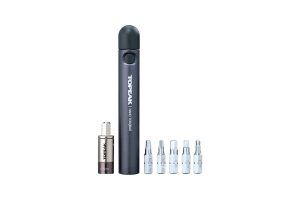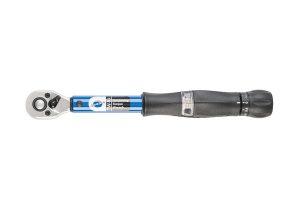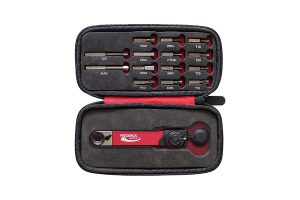The 10 Best Bike Torque Wrenches in 2019
Are you looking to get a high-quality torque wrench for your bike?
If you have a carbon bike frame or use carbon components, the torque wrench is an essential part of your tool kit. It enables you to tighten a bolt to precisely the torque the manufacturer recommends.
No more, no less.
Even the most experienced bike mechanics use them and you should too.
Sometimes, it’d be easy to overlook the importance of a torque wrench or think they are too expensive. But if you’re working on a bike that is worth thousands, surely spending a little on a tool that helps maintain it makes good sense?
A Quick Glance : Our Favorite Torque Wrenches for Cyclists
Preset Torque Wrenches
Topeak Nano TorqBar DX
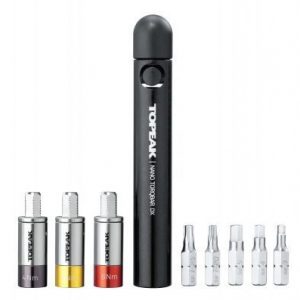
Topeak is another name synonymous with quality bike accessories and tools. It set comes with a torque bit for 4Nm, 5Nm, and 6Nm.
The Topeak Nano TorqBar DX is a rugged but stylish bike tool with storage for two tools along with the wrench itself.
The construction is rugged but top-quality. It’s easy and reassuring to use with a faint click when you hit the target torque value.
The Topeak Nano TorqBar DX can fit into a jersey pocket as well as a tool bag if necessary. It doesn’t come cheap, but you can be assured of a top-quality tool.
- Pros : Comes in all the 3 commonly used torque settings for bicycles.
- Cons : The clicking sound is too soft.
Park Tool ATD-1.2
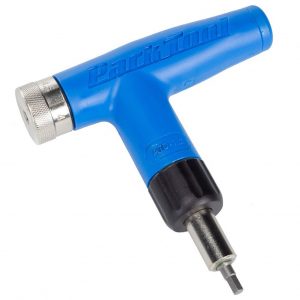
The Park Tool ATD 1.2 is made by market leader Park Tools, whose toolkits are used by many pro mechanics. When you get hands-on with the one, you quickly see why.
It is a combination of preset and adjustable torque, ranging between 4 to 6Nm, in half Nm increments.
It is constructed of steel and plastic and is rugged enough to survive any workshop. Increments are simple to dial in, and the handle is large enough for most hands.
The Park Tool ATD 1.2 is not cheap, but then tools are an investment. If you want something that could outlast your bike, this could be it.
- Pros : High-quality built. You can’t go wrong with Park Tool.
- Cons : Expect to pay a higher price.
Ritchey Torque Key 6-Bits
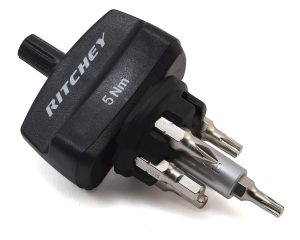
The Ritchey Torque Key is yet another solid choice. Well made, rugged, can torque to exactly 5Nm and it includes a neat holder for extra convenience.
Sure there is a 5Nm limit but most carbon components won’t exceed that anyway.
The key is well designed but not as comfortable in the hand as the Topeak or Park Tool. That said, it is smaller and lighter, so if you’re planning to carry it this might be the one for you.
- Pros : Built-in holder organizes all the different hex bits.
- Cons : Not ideal for those with larger hands.
Pro Bike Tool
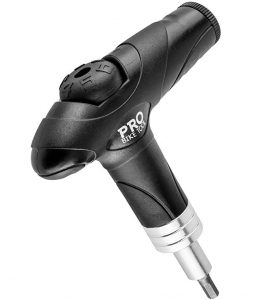
This adjustable torque wrench from Pro Bike Tool looks the business.
The design is cool, the build quality superb, and you have storage for bits too. It’s accurate with three settings at 4, 5, and 6Nm with nothing in-between.
If you’re on a budget, this or the Ritchey is what I’d recommend. It is light, simple to use, and includes the three main torque settings for road bikes.
- Pros : Value for money for those with a tight budget.
- Cons : Doesn’t come with any hex bits.
Click Torque Wrenches
Park Tool TW-5.2
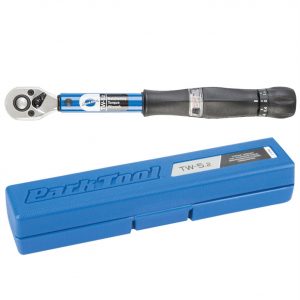
The Park Tool TW-5.2 is the newest click type torque wrench from Park Tool and performs admirably. It’s very well built, easy to handle. The grip sits comfortably in hand and is capable of between 2 to 14Nm.
That should cover everything on a road or mountain bike. The dial adjusts a reassuring click when you set it and a clearly audible click when you hit the correct settings.
About as easy as it gets.
You do pay for the privilege of owning Park Tools, but you know what they say, buy quality, buy once!
- Pros : Quality, quality, quality.
- Cons : Expect to pay a 20-30% premium over similar models.
Pedro's Grande Torque
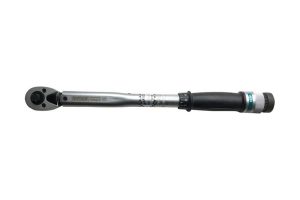
A torque wrench is as precise a tool as you can get when it comes to bike maintenance. You need reliability to make sure those critical parts of your bike are properly tightened.
This torque wrench from bike maintenance specialists Pedro’s features a 10 to 80Nm range, making it well equipped to handle such high torque components as bottom brackets, cranksets, and cassette lockrings.
The wrench is reversible, allowing it to work with right or left-hand threads. Simply set the wrench in increments of 0.5Nm then tighten until you hear the click sound that lets you know you’ve reached the desired tightness.
Pedro’s Grande Torque wrench lists its accuracy at +/- 4%. Adapters for square and hex fittings are included.
- Pros : Includes adapters to convert 3/8″ head to 1/2″ and 1/4″.
- Cons : Clicking sound is not loud enough.
PRO
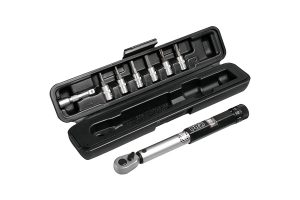
Specialty bike tools can quickly become expensive. So much so that you may be tempted to cut corners by, say, using a standard socket wrench and your intuition instead of a torque wrench to do the job.
PRO has launched just five years ago, prides itself on making precision tools and affordable prices. Torque wrenches are expensive, but this is one of the more affordable models you can buy, and it still does the job.
It offers adjustability from 3 to 15Nm, allowing you to properly torque stems, seat posts, and cranks. And, unlike other models, it includes a socket set and extensions.
And it all fits into a handy storage box for storage.
- Pros : Value for money for the home mechanics.
- Cons : Average build quality.
Effetto Mariposa Giustaforza 2-16
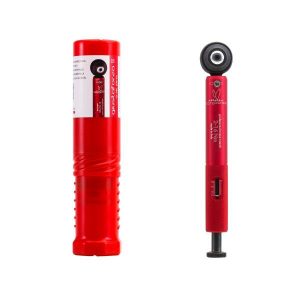
The Effetto Mariposa Giustaforza 2 is a good-looking tool with its own case and includes many tools to use with it.
It’s accurate between 2 to 16Nm, easy to set, and comes with the most popular Torx and Hex heads to use with it.
The case isn’t the hardest wearing, and you will shed a tear when you drop your first bit of grease or drop of oil on it.
Otherwise, this tool is precision engineered and will last a lifetime.
- Pros : Solid, compact, and very high-quality build.
- Cons : Expensive.
Portable Torque Wrenches
Feedback Sports Torque Ratchet
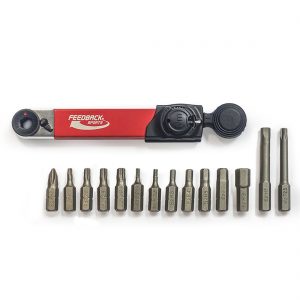
The Feedback Sports Torque Ratchet is relatively new to the market. But once you get your hands on it, you quickly realize it’s up there with Park Tool or Topeak.
The attractive red and black design and case with a bunch of tools make it even more attractive given the price.
Construction is of high quality, measurement is accurate between 2 to 10Nm and the case it very useful for keeping tools together and clean.
The build quality, while good, isn’t quite up there with the above two. The measurement is also a little more difficult to set. This is offset by the inclusion of a range of tools to use with the wrench.
- Pros : Comes with all the common hex bits found on bicycles.
- Cons : Maximum of 10Nm only where most models are between 15-16Nm.
Silca T-Ratchet Kit
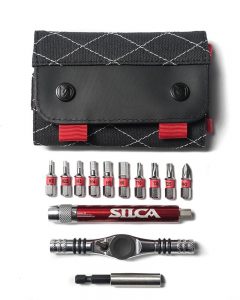
If you’re looking for a portable torque wrench that you can take out onto the road with you, then look no further than this T-Ratchet from Silca, an Italian company that has been making cycling tools since 1917.
This diminutive kit includes a ratchet head for 1.4″ tool bits. It comes with a full complement of 2 to 6mm hex wrenches, three sizes of Torx wrenches, and a Phillips head screwdriver bit.
A extender allows for a torque range of 2 to 8Nm within 2% accuracy. A handy trifold carrying case keeps all these bits organized and secure for when needed.
In fact, this kit weighs in at just 10 oz, making it a great companion for long rides.
- Pros : Small, compact and comes with a nice carrying case.
- Cons : Expensive.
Lezyne Torque Drive
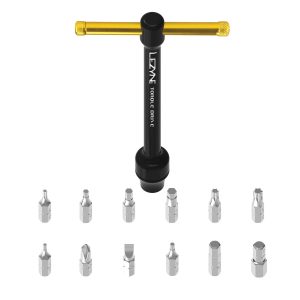
Stop snapping off your bolts and get yourself a torque wrench. Lezyne, a California-based company that has been making bike accessories and tools since 2007, offers this affordable tool for any cyclist to add to their collection of tools.
It features a range of 2 to 10Nm and includes a wide range of hex bits and torque bits and flathead and Phillips-head bits.
A molded carrying case keeps the wrench and bits organized and easy to find when you need them. No need to dig around your tools searching for tiny bits.
- Pros : Comes with all the common hex bits found on bicycles.
- Cons : Heavier than its peers.
Electronic Torque Wrenches
Unior
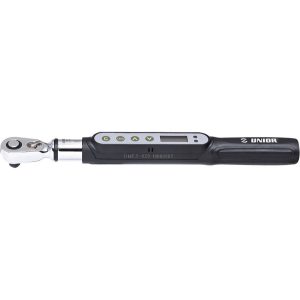
Given how expensive bike components and frames have become, the last thing you want to do is crack your carbon frame by improperly torquing a bottom bracket.
Unior, a tool manufacturer that supplies many Pro Tour teams, seeks to take the guesswork out of this job with its electronic torque wrench. This battery-powered tool features a digital readout that provides you with status updates as you tighten a bolt.
At 95% a green light will appear. A buzzer sounds and a red light comes on when you’ve reached 100%. It registers a torque range of 1 to 20 Nm for its smaller 1/4” square drive version and 4.2 to 85 Nm for its larger 1/2” square drive version.
- Pros : Can be used down to 1Nm (a rarity among torque wrenches).
- Cons : Small display screen.
Topeak D-Torq Wrench
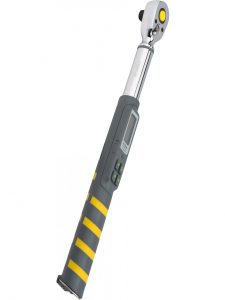
The Topeak D-Torq is a digital torque wrench for the cyclist who has everything. It’s an expensive proposition, but it looks the business and offers simple programmable torque settings and a clear LCD.
Build quality is superb with great quality materials, a comfortable handle, and accurate measurement.
It has the advantage of being able to measure in Nm/kg, Nm/cm, inch/lbs, and ft/lbs for the geeks.
It is costly, though, and requires an AA battery to work. That’s yet another battery to keep an eye on in a workshop potentially full of them!
- Pros : Supports up to 80Nm for all heavy-duty tasks.
- Cons : Expensive.
Types of Torque Wrenches for Bicycles
1. Preset
Preset torque wrenches are exactly that.
They come preset with their torque measurements. The most common preset torque value is 5nm, which most manufacturers recommend for tightening the seat post, saddle, stem, and handlebars.
- Pros. They are simple, easy to use, and good to keep around the workshop. They look like a standard T-wrench with an Allen key or bolt-on end. You twist the tool to tighten, and it will click when the desired torque has been reached.
- Cons. Each tool can only tighten to a single torque value (5Nm), so you’ll need different one for other torque values such as 4Nm or 6Nm.
2. Click
Click torque wrenches are the most popular among bike mechanics. I’m sure you’d probably come across them in your local bike shops too.
They cover a range of torque values from 2nm right up to 16nm or more, depending on the models.
- Pros. The benefits are in its ease of use and ubiquity. You set the intended torque value and tighten until you hear a click sound.
- Cons. They can require calibration which means sending it back to the manufacturer. You also have to take care to set that torque dial accurately as some dials can be tricky to use, especially on cheaper models.
3. Beam
Beam torque wrench is an old tool that uses a simple indicator and scale to show you the current torque level. It needs no calibration, has no real internals, and gets the job done.
- Pros. It’s a straightforward setup. You have the socket at one end and a needle and scale at the other. As you tighten the bolt, the needle moves across the scale to indicate how much torque you are applying.
- Cons. The downside is that it cannot be preset, so you have to pay attention when tightening, and you may have to buy an automotive tool as they aren’t readily available as road bike specific tools.
Do You Really Need a Torque Wrench?
Torque wrenches help you tighten a bolt enough to remain safe and secure but not so much that you stress the component by over-tightening it.
You may think tighter is always better but you won’t when you crush your new stem or seat post because you tightened the bolt too much!
Over tightening can weaken and even shear bolts.
It can also crush steel, aluminum, and carbon frames and components. While steel and aluminum are both susceptible to over-tightening, it’s carbon fiber that you really have to watch out for.
Carbon fiber is an incredibly strong material in the direction it needs to be. Bike frames, stems, bars, and seat posts all have carbon fibers laid in a particular direction to provide strength and flexibility in that direction.
Apply pressure in a different direction and you would be amazed at how little effort it takes to damage it.
Don’t try this at home but you can theoretically crack a carbon seat post just by bending it with your hands!
Carbon fiber needs very careful handling.
Tighten a bolt-on carbon part too much and you could crush the fibers and render the component unusable. The warranty won’t cover that kind of damage. Given how much carbon parts cost, we certainly don’t want that!
So yes, if you want to correctly maintain your bike and keep it safe, you do need a torque wrench. Think of it as an investment in your safety in the same way you would in a bike helmet.
It helps you maintain the correct level of tightness while helping you avoid damaging components or leaving them too loose as to be a hazard. Neither of which you want to experience when riding along a busy road at 30 miles per hour.
Author Recommended Reads

